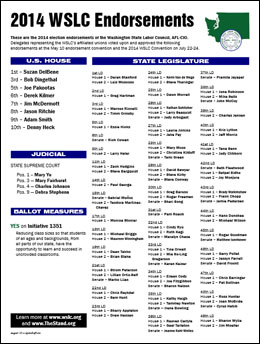NEWS ROUNDUP
Boeing’s biggest risk, hot berries, why low-wage retailers fret…
Wednesday, October 15, 2014
BOEING
 ► MUST-READ from Aviation Week — Greatest long-term threat to Boeing is the loss of talent (by Richard Aboulafia) — In the case of Boeing’s defense side, this risk (of shifting jobs to low-cost states) is probably worth taking, given the pressure it faces from both market forces and competitors. But Boeing Commercial Airplanes is in the exact opposite position of Boeing Defense, Space & Security. In short, BCA’s revenue, market share and profits are all set for growth. Yet Boeing corporate’s approach to labor at BCA has been more draconian than at BDS. Management’s approach will likely have negative consequences for BCA’s long-term prospects. Managing labor for a growth business means attracting and retaining talent. Managing for a retrenching business means a focus on costs. To use a more extreme analogy from a different industry, what works for General Motors is different from what works for Tesla. Boeing management needs to remember the greatest long-term threat to BCA isn’t the cost of labor; it’s the loss of talent and the erosion of core capabilities.
► MUST-READ from Aviation Week — Greatest long-term threat to Boeing is the loss of talent (by Richard Aboulafia) — In the case of Boeing’s defense side, this risk (of shifting jobs to low-cost states) is probably worth taking, given the pressure it faces from both market forces and competitors. But Boeing Commercial Airplanes is in the exact opposite position of Boeing Defense, Space & Security. In short, BCA’s revenue, market share and profits are all set for growth. Yet Boeing corporate’s approach to labor at BCA has been more draconian than at BDS. Management’s approach will likely have negative consequences for BCA’s long-term prospects. Managing labor for a growth business means attracting and retaining talent. Managing for a retrenching business means a focus on costs. To use a more extreme analogy from a different industry, what works for General Motors is different from what works for Tesla. Boeing management needs to remember the greatest long-term threat to BCA isn’t the cost of labor; it’s the loss of talent and the erosion of core capabilities.
EBOLA
► From AP — Second Texas health care workers infected with Ebola — A bleary-eyed Dr. Daniel Varga, the hospital’s chief clinical officer, called the second worker’s infection “an unprecedented crisis” during a news conference.
► From AP — Dallas nurses cite sloppy conditions in Ebola care — A Liberian Ebola patient was left in an open area of a Dallas emergency room for hours, and the nurses treating him worked for days without proper protective gear and faced constantly changing protocols, according to a statement released late Tuesday by the largest U.S. nurses’ union.
 ► In today’s Seattle Times — Health-care union says members unprepared for Ebola cases — Officials of SEIU HealthCare 1199NW, which represents 26,000 health-care workers in Washington state, say its members — particularly those who clean hospital rooms — are not being properly equipped, trained or supported to deal with potential Ebola cases. “I’m very worried,” said Carmencita Smith, a longtime environmental-services worker who cleans rooms at Swedish. “We need better equipment.” She’s worried that by the time a patient is confirmed to have Ebola, hospital workers may have already been exposed. Smith said in 25 years of cleaning up messes most people wouldn’t want to talk about, she’s had minor ailments that may have been caused or aggravated by what she comes in contact with at work. That’s why she’s frightened to be around a virus as deadly as Ebola. But Smith said that when she mentioned her fear to her supervisor this week, she was told not to worry because Swedish won’t get any Ebola cases.
► In today’s Seattle Times — Health-care union says members unprepared for Ebola cases — Officials of SEIU HealthCare 1199NW, which represents 26,000 health-care workers in Washington state, say its members — particularly those who clean hospital rooms — are not being properly equipped, trained or supported to deal with potential Ebola cases. “I’m very worried,” said Carmencita Smith, a longtime environmental-services worker who cleans rooms at Swedish. “We need better equipment.” She’s worried that by the time a patient is confirmed to have Ebola, hospital workers may have already been exposed. Smith said in 25 years of cleaning up messes most people wouldn’t want to talk about, she’s had minor ailments that may have been caused or aggravated by what she comes in contact with at work. That’s why she’s frightened to be around a virus as deadly as Ebola. But Smith said that when she mentioned her fear to her supervisor this week, she was told not to worry because Swedish won’t get any Ebola cases.
 ► In today’s News Tribune — Washington’s nurses can’t be left unprepared for Ebola (editorial) — The Washington State Nurses Association has been surveying its members statewide, asking whether they feel they’ve been adequately trained and equipped to deal with the fatal and fast-moving disease. Most of them are saying no. Nurses in Washington should be taken very seriously when they say they aren’t prepared. They occupy the front lines of health care. When Ebola walks through the door, perhaps looking like the flu, it will likely be a nurse who takes the patient’s temperature, checks his pulse and reviews his history. That nurse must know exactly what to look for and how to respond. If Washington’s nurses don’t feel ready, it’s a good bet the region isn’t nearly as ready as it must be.
► In today’s News Tribune — Washington’s nurses can’t be left unprepared for Ebola (editorial) — The Washington State Nurses Association has been surveying its members statewide, asking whether they feel they’ve been adequately trained and equipped to deal with the fatal and fast-moving disease. Most of them are saying no. Nurses in Washington should be taken very seriously when they say they aren’t prepared. They occupy the front lines of health care. When Ebola walks through the door, perhaps looking like the flu, it will likely be a nurse who takes the patient’s temperature, checks his pulse and reviews his history. That nurse must know exactly what to look for and how to respond. If Washington’s nurses don’t feel ready, it’s a good bet the region isn’t nearly as ready as it must be.
STATE GOVERNMENT
► In today’s Tri-City Herald — CBC makes budget pitch, lawmakers looking for the money — Columbia Basin College and its fellow community colleges across the state need an additional $182 million in 2015-17 to fund their operations, CBC President Rich Cummins told lawmakers Tuesday. The state’s 34 community colleges have a $619 million budget for the current academic year. That’s down from the nearly $1 billion the colleges received annually before the national recession in 2008. State lawmakers didn’t oppose anything Columbia Basin College officials proposed Tuesday, but they aren’t sure how the Legislature is going to pay for the requests along with the rest of the state’s obligations — particularly the state Supreme Court’s order to fully fund K-12 education. Said state Rep. Maureen Walsh (R-College Place): “I’m not sure if we’re going to get away with not finding another (revenue) source to meet all these needs.”
 ► From AP — Ethics panel defines how many free meals a lawmaker can eat — Starting in January, lawmakers can accept no more than 12 free meals from lobbyists each year under a rule approved unanimously Tuesday by The Legislative Ethics Board.
► From AP — Ethics panel defines how many free meals a lawmaker can eat — Starting in January, lawmakers can accept no more than 12 free meals from lobbyists each year under a rule approved unanimously Tuesday by The Legislative Ethics Board.
► In today’s Oregonian — Legality of PERS reforms gets dissected before Oregon Supreme Court — Bottom line, what’s at issue is which elements of the state statutes governing the Public Employees Retirement System constitute a contract with public employees, and which can be changed. And what’s at stake are billions of dollars in budget savings for public employers, and a like amount in future benefit payments for public employees… Public employees are challenging the legality of the changes, arguing that they violate the contract clauses of the Oregon and U.S. constitutions and amount to an illegal taking of private property without compensation.
LOCAL
 ► In today’s Bellingham Herald — Farms angry at Labor Department crackdown on suspected worker abuses — An attempted crackdown on minimum wage and child labor violations at berry farms in the Pacific Northwest has sparked a backlash that threatens one of the U.S. Labor Department’s most potent tools for enforcing protections for farm workers. At issue is the little-known “hot goods’’ provision of federal wage law. It allows the government to halt shipments of goods produced in violation of employment laws. The weapon has been used mainly to combat minimum wage and overtime pay abuses by garment makers but, under President Obama, federal officials have invoked the hot goods provision against farm owners somewhat more often than earlier administrations. Farmers and their political allies have lined up behind a bill in Congress to prevent authorities from using the hot goods provision to stop shipments of perishable crops like berries. Even if the bill does not pass the gridlocked Congress, worker advocates worry that the backlash might have a chilling effect on the agency, or that its use of the tactic could be restricted through the budget process.
► In today’s Bellingham Herald — Farms angry at Labor Department crackdown on suspected worker abuses — An attempted crackdown on minimum wage and child labor violations at berry farms in the Pacific Northwest has sparked a backlash that threatens one of the U.S. Labor Department’s most potent tools for enforcing protections for farm workers. At issue is the little-known “hot goods’’ provision of federal wage law. It allows the government to halt shipments of goods produced in violation of employment laws. The weapon has been used mainly to combat minimum wage and overtime pay abuses by garment makers but, under President Obama, federal officials have invoked the hot goods provision against farm owners somewhat more often than earlier administrations. Farmers and their political allies have lined up behind a bill in Congress to prevent authorities from using the hot goods provision to stop shipments of perishable crops like berries. Even if the bill does not pass the gridlocked Congress, worker advocates worry that the backlash might have a chilling effect on the agency, or that its use of the tactic could be restricted through the budget process.
► In today’s Peninsula Daily News — Clallam rejects mediator proposal, but is willing to work with Teamsters on new contract — Both county and union officials said that the county and its largest union (Teamsters Local 589) are close to settling a new labor contract that has been in the works for 22 months.
TODAY IN POLLS
 ► In today’s Washington Post — The Democratic Party hits a 30-year low — The Democratic Party is held in worse regard than at any point in the past 30 years, according to a new poll. The poll, from the Washington Post and ABC News, shows 39 percent of Americans now have a favorable impression of the blue team, while 51 percent have an unfavorable impression. Both are new records. Through it all, of course, Democrats continue to have a better image than their GOP counterparts, whose favorable/unfavorable split with the American people is currently 33/56. But the Democrats’ drop is particularly notable given they have never polled below a 46 percent favorable rating.
► In today’s Washington Post — The Democratic Party hits a 30-year low — The Democratic Party is held in worse regard than at any point in the past 30 years, according to a new poll. The poll, from the Washington Post and ABC News, shows 39 percent of Americans now have a favorable impression of the blue team, while 51 percent have an unfavorable impression. Both are new records. Through it all, of course, Democrats continue to have a better image than their GOP counterparts, whose favorable/unfavorable split with the American people is currently 33/56. But the Democrats’ drop is particularly notable given they have never polled below a 46 percent favorable rating.
► At Politico — Poll: Obama hits lowest voter approval — President Barack Obama’s approval rating is at the lowest level of his presidency, a new poll says. According to an ABC News/Washington Post poll released Wednesday, 40 percent of Americans approve of Obama’s job performance, the lowest score the poll has recorded since he took office.
ELECTION
 ► In today’s Seattle Times — New poll: Class-size initiative has hefty lead — Initiative 1351, a measure on the November ballot to increase school staffing and decrease class sizes of students, has a 42-point lead in a new Elway Poll released this morning.
► In today’s Seattle Times — New poll: Class-size initiative has hefty lead — Initiative 1351, a measure on the November ballot to increase school staffing and decrease class sizes of students, has a 42-point lead in a new Elway Poll released this morning.
EDITOR’S NOTE — The Washington State Labor Council, AFL-CIO has endorsed I-1351. See the WSLC’s complete list of election endorsements.
► At Politico — Appeals court unblocks Texas Voter ID law — On Thursday evening, a U.S. District Court judge ruled that Texas’s voter ID law is unconstitutional and violates the Voting Rights Act by making it more difficult for minorities to vote. On Tuesday, U.S. Court of Appeals judges (appointed by George W. Bush) put that order on hold allowing the Voter ID law to be imposed “based primarily on the extremely fast-approaching election date.”
EDITOR’S NOTE — So, they agree the law may be discriminatory, but at this point, allowing people to vote without IDs would be too confusing?! WTF?
► In today’s Washington Post — Federal workers facing tougher time if GOP wins Senate — House-approved bills show how federal workers might fare if Republicans control the Senate.
► At Think Progress — Scott Walker: Minimum wage doesn’t serve a purpose — Wisconsin Gov. Scott Walker (R) was asked whether there should be a minimum wage. He responded, “I’m not going to repeal it, but I don’t think it serves a purpose.”
 ► At Politico — Koch donors uncloaked — The deep-pocketed political network created by the billionaire conservatives Charles and David Koch this summer quietly launched a super PAC that can buy explicitly political ads supporting Republican candidates rather than the issue-oriented ads they‘d been airing for years. The catch: For the first time, the network’s donors would be publicly identified if they gave to the super PAC. An advance copy of its FEC report shows New York hedge fund billionaire Bob Mercer wrote the largest check — $2.5 million — followed by Charles and David Koch, who each stroked $2 million checks from trusts in their names. The group received $1 million apiece from Arkansas poultry producer Ronnie Cameron, Wisconsin roofing billionaire Diane Hendricks, and Nebraska trucking magnate Clarence Werner.
► At Politico — Koch donors uncloaked — The deep-pocketed political network created by the billionaire conservatives Charles and David Koch this summer quietly launched a super PAC that can buy explicitly political ads supporting Republican candidates rather than the issue-oriented ads they‘d been airing for years. The catch: For the first time, the network’s donors would be publicly identified if they gave to the super PAC. An advance copy of its FEC report shows New York hedge fund billionaire Bob Mercer wrote the largest check — $2.5 million — followed by Charles and David Koch, who each stroked $2 million checks from trusts in their names. The group received $1 million apiece from Arkansas poultry producer Ronnie Cameron, Wisconsin roofing billionaire Diane Hendricks, and Nebraska trucking magnate Clarence Werner.
NATIONAL
► From WRAL (in Raleigh, NC) — Despite big job promises, incentives often fail to deliver — At groundbreaking ceremonies, ribbon cuttings and company-wide announcements, governors in North Carolina have for decades appeared alongside corporate executives to herald the coming of new jobs. They’re aided by millions in taxpayer dollars that North Carolina, much like other states, uses to lure and retain businesses. But years after these jobs were announced by executives and state leaders, most failed to fully materialize, a WRAL News analysis found. More than 100 companies named in job announcements since 2009 have since reported no new jobs. Some have laid off workers or closed up shop altogether.
► At Think Progress — The 1 percent has half the world’s wealth — The good news: total global wealth just hit a new record. The bad news: most of it is going to the richest of the rich.
► In The Hill — White House announces $170M push to help long-term unemployed — The funding will go toward programs in 20 states, including apprenticeship programs; career services opportunities with dozens of national companies; mental health options; and early education programs; among other resources.
TODAY’S MUST-READ
 ► At Huffington Post — Two-thirds of America’s biggest retailers are worried about flat wages — Researchers analyzed the most recent SEC 10-K filings of the largest 100 retailers in the country and found that more than two-thirds of these corporations — a group that includes, Walmart, Apple, McDonald’s and J.C. Penney — issued warnings to investors that profits could be hampered by flat wages, high unemployment and low consumer spending. But even as two-thirds of the companies in the study pointed to stagnating wages as a source of their problems, many of them have opposed or stayed silent on any proposed wage increases.
► At Huffington Post — Two-thirds of America’s biggest retailers are worried about flat wages — Researchers analyzed the most recent SEC 10-K filings of the largest 100 retailers in the country and found that more than two-thirds of these corporations — a group that includes, Walmart, Apple, McDonald’s and J.C. Penney — issued warnings to investors that profits could be hampered by flat wages, high unemployment and low consumer spending. But even as two-thirds of the companies in the study pointed to stagnating wages as a source of their problems, many of them have opposed or stayed silent on any proposed wage increases.
The Stand posts links to Washington state and national news of interest every weekday morning by 10 a.m.





